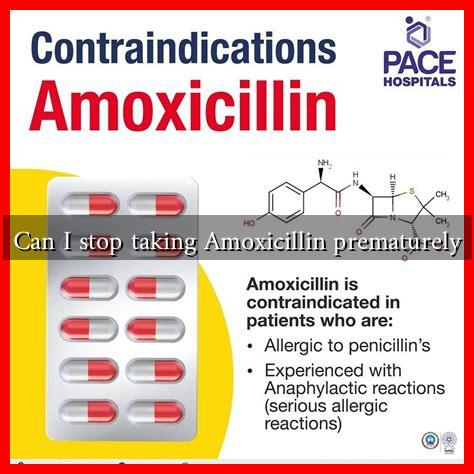-
Table of Contents
Can I Stop Taking Amoxicillin Prematurely?
Amoxicillin is a widely prescribed antibiotic used to treat various bacterial infections, including pneumonia, bronchitis, and infections of the ear, nose, throat, skin, and urinary tract. While it is effective in combating these infections, many patients wonder about the implications of stopping the medication prematurely. This article explores the consequences of discontinuing Amoxicillin before completing the prescribed course, the importance of adherence to antibiotic regimens, and what patients should consider before making such a decision.
The Importance of Completing Antibiotic Courses
Antibiotics like Amoxicillin are designed to eliminate bacteria from the body. When a patient begins to feel better, it can be tempting to stop taking the medication. However, this can lead to several issues:
- Incomplete Treatment: Stopping Amoxicillin early may not fully eradicate the infection, allowing bacteria to survive and potentially lead to a resurgence of symptoms.
- Antibiotic Resistance: Incomplete courses of antibiotics can contribute to the development of antibiotic-resistant bacteria. According to the World Health Organization (WHO), antibiotic resistance is a significant global health threat, leading to longer hospital stays, higher medical costs, and increased mortality.
- Increased Risk of Complications: Failing to complete the prescribed course can result in complications from the original infection, which may require more aggressive treatment or hospitalization.
Understanding the Risks of Premature Discontinuation
When patients stop taking Amoxicillin prematurely, they risk not only their health but also the broader implications of antibiotic misuse. A study published in the journal Clinical Infectious Diseases found that patients who did not complete their antibiotic regimen were more likely to experience recurrent infections. This can lead to a cycle of repeated treatments and increased healthcare costs.
Case Study: The Impact of Non-Adherence
Consider the case of a 35-year-old woman diagnosed with a severe urinary tract infection (UTI). After three days of taking Amoxicillin, she felt significantly better and decided to stop the medication. Within a week, her symptoms returned, and she required a stronger antibiotic to combat the now-resistant bacteria. This scenario illustrates the potential consequences of not adhering to prescribed antibiotic courses.
When Is It Appropriate to Stop Taking Amoxicillin?
While it is generally advised to complete the full course of antibiotics, there are specific situations where a healthcare provider may recommend discontinuation:
- Allergic Reactions: If a patient experiences an allergic reaction to Amoxicillin, such as hives or difficulty breathing, they should stop taking the medication immediately and seek medical attention.
- Severe Side Effects: Some patients may experience side effects that are intolerable, such as gastrointestinal distress or severe headaches. In such cases, consulting a healthcare provider is essential.
- Change in Diagnosis: If a healthcare provider determines that the initial diagnosis was incorrect, they may recommend stopping Amoxicillin in favor of a more appropriate treatment.
Consulting Your Healthcare Provider
Before making any decisions about stopping Amoxicillin or any other medication, it is crucial to consult with a healthcare provider. They can provide guidance based on individual health needs and circumstances. Patients should never self-discontinue antibiotics without professional advice.
Conclusion
In summary, stopping Amoxicillin prematurely can have serious consequences, including incomplete treatment, antibiotic resistance, and increased risk of complications. It is essential for patients to understand the importance of adhering to prescribed antibiotic regimens and to consult their healthcare provider if they have concerns about their treatment. By doing so, they can ensure effective treatment of their infections and contribute to the broader fight against antibiotic resistance.
For more information on antibiotic use and resistance, visit the World Health Organization.

